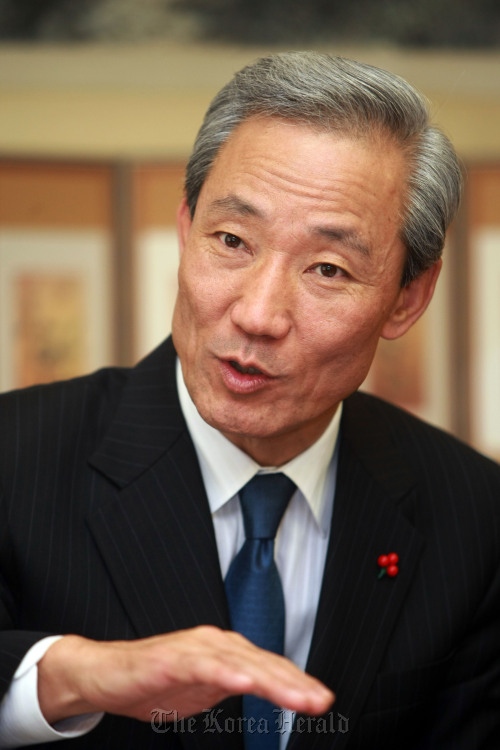
Kim Jong-hoon
Tomorrow, the free trade agreement between the Republic of Korea and the European Union will finally enter into force. With the publication of the agreement in the official gazettes of the two sides the day before yesterday, all the required procedures have been completed and we are now about to embark upon the smooth implementation of the agreement.
As is often said, well begun is half done. But as it literally says also, that is nonetheless only half done so far. The other half will have to come from the efforts for its implementation from the players in the market: businesses, consumers and governments. While governments have been the main player for the first half, now it is the turn of the business sector to play the main role in accomplishing the remaining half.
The Korea-EU FTA is like a brand new machine to be utilized for our growth and development. Learning about the important features of the machine itself and mastering the proficient usage of it must come first.
The main features of the Korea-EU FTA can be viewed from various aspects.
Foremost, the Korea-EU FTA has great significance in itself. It is a “new generation FTA” which stands as a model of economic cooperation for FTAs to be concluded in the future. Simply put, the Agreement to enter into force tomorrow is the most comprehensive and high-level trade deal that either Korea or the EU have ever concluded.
The Korea-EU FTA covers fields from trade in goods to trade in services, investment and rules. Its comprehensive scope is expected to bring Korea and the EU closer in every aspect of our daily lives. Furthermore, the Korea-EU FTA boasts a high level of trade liberalization, with elimination of all industrial tariffs within seven years for Korea and within 5 years for Europe. It will lead both sides to realize their market potential to the fullest extent.
Secondly, the economic implications of the Korea-EU FTA are undeniable. Korea and the EU are already important partners in trade and investment. In 2009, the EU was Korea’s second largest trading partner only after China and also Korea’s number one foreign investor. The Korea-EU FTA is about to deepen this economic partnership still further.
Just to give an idea, studies done in Korea and the EU both estimated that the average annual increase in bilateral trade would reach up to approximately $5 billion over the next 15 years once the Korea-EU FTA is brought into effect.
Moreover, the economic impact of the agreement will not be limited to an increase in bilateral trade and investment. For Korea, the agreement will induce its neighbors to invest in Korea in search of easier access to the European markets. As for the EU, it will provide a springboard to advance into the broader markets of Asia since Korea is the first Asian partner for an FTA.
Thirdly, the Korea-EU FTA holds strategic significance in terms of Korea-EU relations. Korea is one of the ten Strategic Partners of the EU, sharing the common values of democracy and the market economy. Along with the Korea-EU Framework Agreement which was also signed in 2010, the Korea-EU FTA will serve as a solid pillar of the strategic partnership.
Given the above-mentioned features and implications, the entry into force of the Korea-EU FTA has been awaited with keen anticipation by many people. Although we have achieved this well-balanced agreement through several rounds of tough negotiations, it can only be materialized with proper implementation and utilization. Whether the new FTA with such a large economy as the EU in force will bring opportunities or challenges will depend on our concerted efforts in this respect.
At the dawn of a new era, most people are at a loss as to what to do. However, the direction we should head for is quite clear.
First of all, it is very important that the private sector stays well informed of the details of the Agreement. Close communication between businesses and governments to fill the gap in the information on the implications of the Agreement for business communities is highly recommended. Although the governments negotiated and agreed on the terms of this FTA, it is businesses that shall eventually benefit from its application.
Also, establishing and maintaining channels of cooperation between Korea and the EU is crucial. That is because even the most thorough preparations cannot guarantee flawless implementation. In the early stages of implementing the FTA, we may encounter problems, both big and small. The essential element in of implementing the Korea-EU FTA would be how we are poised to deal with these problems, with the built-in mechanisms for consultations and dispute settlement.
The “Trade Committee,” the highest decision-making body in implementing the Korea-EU FTA, is to be held later this year in Seoul. As the co-chair, I will personally see to it that it plays a primary role in facilitating consultations for the smooth implementation of the Agreement and plays an invaluable part in turning this FTA into a great opportunity for us.
The Korea-EU FTA is a trade deal which will level the playing field for industries from both Korea and the EU and allow them a competitive advantage against industries from third countries. As we exert our best efforts to implement and utilize the Agreement, the Korea-EU FTA will be the best gift for both economies in times of global economic downturn.
The year 2011 will mark a watershed in Korea’s trade policy and will promote Korea as a new FTA hub in the region. I believe that the devotion and determination which have brought us here will also lead the way for the KORUS FTA awaiting ratification in both Korea and the United States. The Korea-EU FTA will certainly prove that trade deals with big economies can be a win-win game.
By Kim Jong-hoon, Minister for Trade, Ministry of Foreign Affairs and Trade


![[Herald Interview] 'Amid aging population, Korea to invite more young professionals from overseas'](http://res.heraldm.com/phpwas/restmb_idxmake.php?idx=645&simg=/content/image/2024/04/24/20240424050844_0.jpg&u=20240424200058)



